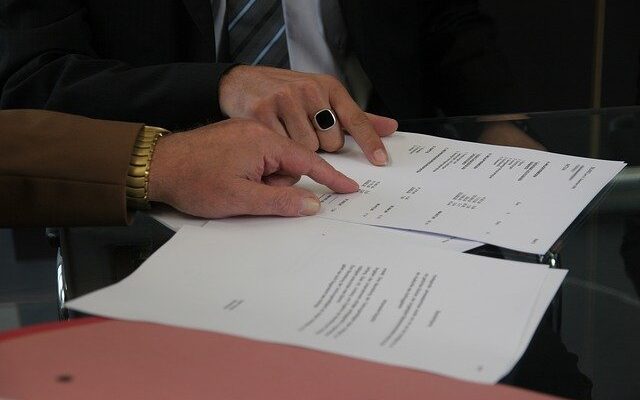How does a Lease Agreement Work? And Difference between Lessor and Lessee Agreement

Lease agreement spell out each party’s responsibilities for carrying out and maintaining the agreement, and they are enforceable by both parties. A landlord benefits from a leasing arrangement since it ensures a steady stream of long-term income.
On the other hand, the agreement is beneficial for a tenant since it carves out a predefined rental amount and lease period, both of which cannot be modified.
The lease agreement, which both parties have examined and signed, ensures several things. Besides establishing the lessor’s and lessee’s rights and duties, it also discusses the ramifications if either partner fails to maintain their half of the bargain. This involves fines and fees, as well as the threat of eviction or repossession.
The leasing arrangement is often time-limited, which can be favourable to both sides. The lessee can search for a new lease arrangement or renew the ongoing lease at the expiration of the stipulated time, while the lessor can opt to renew the agreement with the lessee or do something different with the asset, such as keep it for himself or sell it for good.
What is a lessor and lessee agreement?
The formal or informal contract that regulates a lessor and lessee’s relationship is known as a lessor and lessee agreement. It’s also called a lease or a rental agreement and is a formal agreement for both parties to sign. Note that it can also be an oral agreement depending on the scenario and the particular province’s rules.
The key benefit of entering into a lease arrangement for a lessor is that they keep ownership of the property while earning a return on their investment. Periodic payments may be cheaper to finance for the lessee than the purchase price of the entire property.
The agreement spells down the terms and conditions, legal requirements, and other crucial details around the asset. Both parties must follow the provisions of the lease agreement. The lessor has the authority to terminate the lease agreement or expel the lessee from the premises if the lessee violates the terms of the lease agreement.
Lessor vs lessee: what’s the difference?
A lessor is a person who leases property to another person. He’s the owner of an asset that leases it to a lessee under a contract. In exchange for the use of the property, the lessee pays the lessor a one-time payment or a series of ongoing payments – i.e. rent.
Note that the lessor has restricted rights regarding repairs over the assets leased and upkeep when he leases an immovable property. He does, however, have the authority to terminate the lease arrangement if he discovers any illegal use of the property or malicious damage.
Usually, the lessor pays property taxes, government fees, and other legal fees until it is agreed in advance that the lessee would pay them.
A person who rents land or property from a lessor is known as a lessee. The lessee, often known as the “tenant” is responsible for fulfilling specific responsibilities outlined in the lease agreement and by law.
The lessee agreement demonstrates that the lessee is permitted to occupy the property and has temporary possession of it. But he cannot be considered the owner since ownership belongs to the lessor.
The asset when returned to the lessor, will be thoroughly checked by him/her for any losses. The lessee may be held liable for any damages, as per the lease agreement.
Terms in a lease agreement
Duration
The length of time that the leasing agreement will be in force.
Information of all occupants and tenants
This includes the names and contact details (such as personal and work phone numbers and email addresses) of the lessor and everyone living in the rental unit.
Rent
The section contains the whole rent (also called the lawful rent), and also provides information on when the rent must be paid, to whom it must be paid, the payment methods, as well as any administrative fees associated with cheques returned by a banking institution.
Deposit
It includes the necessary deposit amount (if any), the purpose of each deposit, and the circumstances for deposit return or modification at the lease termination.
Repairs and maintenance
This section emphasizes that while the landlord is responsible for maintaining the rental unit and property, the tenant is responsible for repairing or compensating the landlord for any damage caused by the tenant or their visitors.
Additional terms
This contains any additional terms with regards to the tenancy that are agreed upon between the landlord and tenant. These regulations or requirements must be appended to the lease agreement.
Insurance policy for tenants
Renters need tenant insurance to protect themselves and their belongings. Therefore, most landlords include tenant insurance as a requirement in their Residential Lease.
Utilities and services
This section lists out the services that are included in the overall rent and the ones that are not.
Endnote
Now you know that a lease is a contract between a lessor and a lessee. The leasing agreement is crucial because it lays out the terms and conditions for use of assets.
Both the lessor and the lessee are expected to abide by the lease agreement terms. Irrespective of whether you’re the lessee or the lessor, make sure you’re up to date with the relevant federal, state, and local regulations.
Conclusion:
If you’ve ever handled matters of land or property, you surely have heard the term “lease”. A person who wants to rent out their apartment or property normally “leases” it. Surprisingly, individuals overlook minor details in a lease document, causing a fuss.
Property values are growing so quickly in many sections of Ontario that even wealthy professionals cannot invest in real estate. As a result, a growing number of working individuals and families are opting to rent rather than buy.
The phrases lessor and lessee are commonly used in lease agreements. However, not everyone understands what they represent. If you’re planning on leasing an apartment in the GTA, don’t forget to invest in tenant insurance — if you’re having a hard time finding quotes, you can get Toronto tenant insurance here.















Hi there to all, it’s in fact a fastidious foor me to go to
see this web page, it contains useful Information. https://Vavada.Widezone.net
Heya i amm for tthe first time here. I found tis board
and I find It truly useful & it helped me out a lot.
I hope to give somethig back and help others like you aided me. https://casinoonlinevavada.Onepage.website/